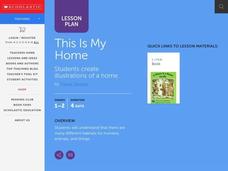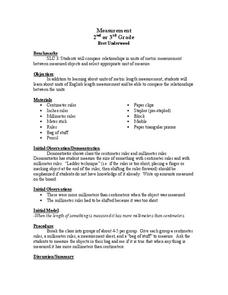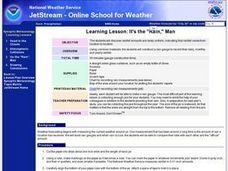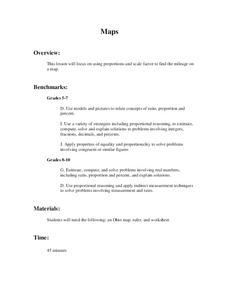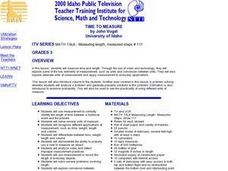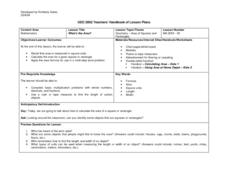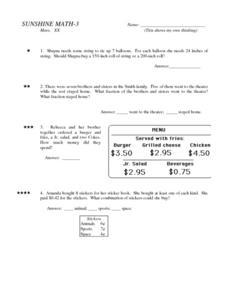Curated OER
This Is My Home
Students listen to a read aloud of Mary Ann Hoberman's A House Is a House for Me before discussing the meaning of habitats and the different types of homes that people live in. Next, they pretend to be architects and design a home for...
Curated OER
Egg Fun
Students explore the physical properties of eggs. In this scientific observation lesson, students define characteristics of eggs, measure eggs vertically and horizontally, and use the scientific method to perform simple experiments using...
Curated OER
Size Riddles
Students investigate shapes and sizes by creating a riddle. For this geometry lesson, students read one of two books and investigate facts about an object's size. Students write a riddle using the facts they have read and cut...
Curated OER
Conservation of Energy
Fifth graders identify situations in which kinetic and potential energy are exchanged and identify the direction of energy transfer using marbles and flexible foam track. They observe how the marbles move spontaneously when released...
Curated OER
Measurement Tools
Which of these is the best tool for the job? Learners examine a measurement scenario and determine which of five tools would be the right choice. There is only one problem, and the worksheet includes pictures. Because the answer is...
NOAA
Wet Maps
How do oceanographers make maps under water? Junior explorers discover the technologies and processes involved in creating bathymetric maps in part three of a five-part series designed for fifth- and sixth-grade pupils. The lesson...
K12 Reader
Measuring Temperature
Fahrenheit? Celsius? What's the difference, and where did these two temperature scales originate? Your pupils will learn all about these topics by reading the passage included here. After reading, individuals respond to five questions...
Virginia Department of Education
Modeling the Big Bang Theory
Young astronomers learn about the Big Bang Theory and redshift through a hands-on activity in the last installment of a three-part series. Participants draw dots on balloons and then inflate them to model how galaxies moved farther apart...
Liberty High School
Science Department Lab Report Format
Make sure your scientists are reporting their work effectively by providing them with a reference for their lab reports. The first few pages of this resource detail each element of a lab report, and the last few pages provide an example...
Scholastic
Discussion and Dissection of an Owl Pellet
Young scientists get the chance to dissect pellets "owl" by themselves to determine the owls environment and nourishment. This is the third part of a three-part series.
NOAA
Animals of the Fire Ice
When the sun's rays can't reach the producers in a food web, where does all the energy come from? Extreme environments call for extreme food sources. Young scientists investigate creatures that appear to get their energy from methane...
Curated OER
Hands On: Measure Length
In this measurement learning exercise, students use a picture of a ruler to answer 4 questions, then solve 2 additional problems and write to explain these answers.
Curated OER
Map Scale and the Pioneer Journey
Fourth graders, using a map, ruler and calculator, determine the distance the pioneers traveled from Nauvoo, Ill. to the Salt Lake Valley.
Curated OER
Measuring Body Parts
Young scholars engage in a lesson to measure body parts. They use the measuring tape to record the data of body measurements. Students must choose the appropriate unit of measurement and compare the data for the different parts of the...
Curated OER
Holiday Timeline
Students create a timeline to represent state and national holidays. In this social studies lesson, students use colored popsicle sticks along a line drawn on a piece of paper to illustrate when holidays occur.
Curated OER
Measurement
Students investigate the relationship between metric length measurement and English length measurement units. They watch a demonstration of the use of centimeter and millimeter rulers before practicing using the Ladder technique to...
Curated OER
Learning Lesson: How To Make A Rain Gauge
Young scholars discover that rainfall amounts are rarely uniform which means the amount of rain is different from location to location. They construct their own rain gauge using everyday materials.
Curated OER
The State of the Family Timeline
First graders study concepts of time and chronological history. In this early childhood history lesson plan, 1st graders create and interpret a timeline listing historical events and family celebrations using one calendar year.
Curated OER
Maps
Young scholars figure out the mileage from one state to another using a map. In this map instructional activity, students look at the scale factor and turn it into a fraction. They measure the distance between two cities and use the...
Curated OER
Neat Feet
Students view a video and discuss different kinds of feet found in the animal kingdom. They make prints using paint, rubber stamps and their own feet and then measure and compare the tracks.
Curated OER
Geometry: Area Project
Sixth graders identify and use area formulas for finding the area of geometric shapes.
Curated OER
Time To Measure
Third graders measure time and length. Through the use of video and technology, they explore key elements of measurement, such as units and conversion between units. They explore alternate units of measurement and apply measurement to...
Curated OER
What's the Area?
Fifth graders use area to calculate the cost for new flooring. They find the area of a square or rectangle. Calculating Area problems and worksheet are attached.
Curated OER
Sunshine Math-3
In this math problem solving worksheet, students examine and solve 8 math word problems that require them to use problem solving skills.
